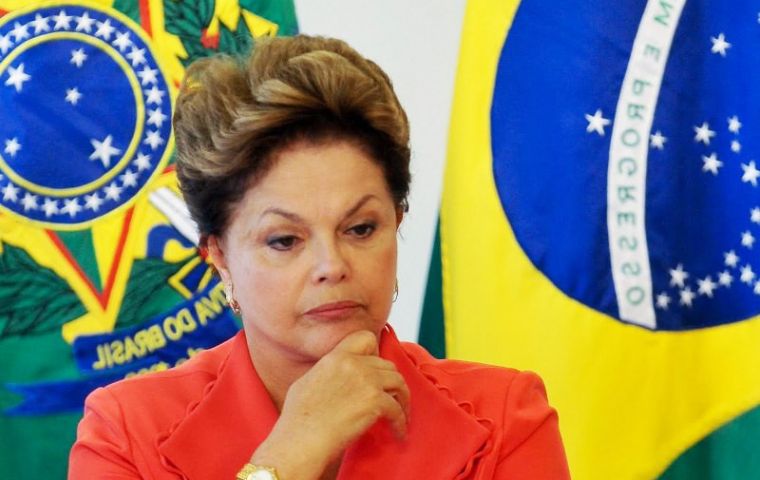MercoPress. South Atlantic News Agency
Rousseff's approval ratings languish: two thirds consider her government “bad or terrible”
 Only 10% of respondents in a survey by Ibope released on Wednesday said her government was “excellent” or “good,” up slightly from 9% in July
Only 10% of respondents in a survey by Ibope released on Wednesday said her government was “excellent” or “good,” up slightly from 9% in July Brazilian President Dilma Rousseff's approval ratings languished in September, held down by the country’s economic and political crises, as her opposition in Congress considers opening impeachment proceedings.
Only 10% of respondents in a survey by the Ibope polling agency released on Wednesday said her government was “excellent” or “good,” up slightly from 9% in a July poll, a difference within the survey’s two-percentage-point margin of error. Of the 2002 people interviewed, more than two-thirds said her government was “bad” or “terrible.”
Ms. Rousseff’s popularity has plummeted this year as the country’s economy has struggled and a corruption scandal at state-controlled oil company Petrobras has grown. Ms. Rousseff hasn’t been implicated in the scandal, but scores of prominent politicians, including those from her party and allied parties, are under investigation.
“The combination of the two crises has been terrible” for her approval ratings, said Renato da Fonseca, executive director of research at Brazil’s National Confederation of Industry, which sponsored the Ibope poll. “People’s (economic) situation is still the same as in the previous poll.”
Ms. Rousseff’s low approval ratings have sapped her influence in Congress, which has refused to pass many of her government’s proposals to cut the budget deficit. Tax increases and spending cuts have languished in the bicameral legislature, which has preferred to pass bills that would instead expand the deficit.
Ms. Rousseff has vetoed dozens of those spending proposals and last week achieved a small victory when Congress failed to overturn most of those vetoes. Her relationship with legislators is nevertheless bad enough that many are still calling for the president to be impeached over alleged budget maneuvers in her first term in office. Ms. Rousseff denies any irregularities occurred.
Approval of Ms. Rousseff’s administration among people who voted for her fell slightly, but within the margin of error, to 17% from 19% in the previous poll, Ibope said. The latest reading is down from 63% in December 2014.
Ms. Rousseff won re-election in October last year with the smallest margin in Brazil’s post-dictatorship democracy. Since the election, the corruption investigation at Petrobras, has spread.
Heads of several of Brazil’s biggest construction companies have been arrested, charged and sentenced to jail terms for inflating the price of contracts with Petrobras, and using the money to bribe political officials, most of them from Rousseff's coalition.




Top Comments
Disclaimer & comment rules-

-

-

Read all commentswhere's brasso?
Oct 01st, 2015 - 04:03 pm 0arf!
Didn't the 'opposition' recently make a claim she had lied about, and misused, the economic data, thus undermining congress and breaching the law?
Oct 01st, 2015 - 05:45 pm 0And hasn't she had until 15th October to come up with the lies, sorry, evidence that she is as white as snow. OK the piss-holes are yellow, but she is white!
Chris and Ilsen
Oct 01st, 2015 - 09:28 pm 0Changing our leader was a god send. Business and industry groups are hailing a potential new reform agenda and it seems there may be impetus to shock our economy out of the rut we are now in and drive growth again.
Mind you unemployment isn't growing and our economy is growing but the threat of a recession seems to he receding every week. Now mind you, should China hit the skids big time then we will feel it instantly and deeply, but so far we are nowhere near on problems like Brazil.
China hitting the skids might send us into a short and sharp recession but it would push Brazil over the edge into depression.
Thankfully our system lets us reject ineffectual leaders much easier than Brazil or even most republics.
Commenting for this story is now closed.
If you have a Facebook account, become a fan and comment on our Facebook Page!